Sustaining Digital Travel: Business Continuity Management for Traveloka
Chapter 15
Testing and Exercising Phase for Traveloka
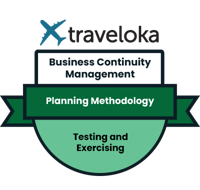
 The Testing and Exercising phase is an integral and non-negotiable element of any comprehensive Business Continuity Management (BCM) planning methodology.
The Testing and Exercising phase is an integral and non-negotiable element of any comprehensive Business Continuity Management (BCM) planning methodology.
It allows organisations to verify that their resilience strategies are well-documented, fully functional, and practical when faced with disruptions.
A well-executed testing and exercising phase ensures that the company's BCM plans can be immediately implemented when needed, minimising downtime and mitigating the impact of an event.
For Traveloka, operating in the ever-changing and high-stakes travel and hospitality sector, where customer expectations are constantly evolving and operational disruptions can have significant financial and reputational consequences, conducting regular and rigorous testing of their BCM plans is vital.
These exercises are crucial to identifying any vulnerabilities or gaps in the plans and allow the company to address these weaknesses before a crisis occurs.
 Furthermore, the testing phase helps streamline internal processes, ensure that necessary tools and systems are fully operational, and confirm that all employees are well-prepared and understand their roles in an emergency.
Furthermore, the testing phase helps streamline internal processes, ensure that necessary tools and systems are fully operational, and confirm that all employees are well-prepared and understand their roles in an emergency.
When all teams—whether in operations, IT, or customer service—are thoroughly familiar with their responsibilities, the likelihood of confusion or delays in a crisis is significantly reduced.
Types of Tests and Exercise
Testing for BCM can be divided into two main categories: initial (basic) tests and Advanced tests. While distinct in their complexity, these two types of exercises complement each other and play equally important roles in strengthening an organization’s overall business continuity framework.
Initial tests are the first step in validating the most fundamental aspects of the BCM plan. In contrast, advanced tests push the boundaries of preparedness, simulating more complex scenarios to ensure that the company is prepared for simple disruptions and is resilient in the face of multifaceted, high-impact crises.
Together, these phases ensure that Traveloka's BCM strategy is robust, comprehensive, and adaptable, making it well-positioned to safeguard its operations, assets, and reputation in any unforeseen disruptions.
(a) Initial Tests
Initial tests serve as the foundation for any successful BCM plan. They help verify that individual components and teams are prepared to respond to crises and understand their responsibilities. These tests are more straightforward and less disruptive and usually involve a limited scope.
Component Tests
Component tests focus on specific BCM elements, such as IT infrastructure, data recovery processes, or communication systems.
By testing individual components, Traveloka can ensure these isolated functions work during an actual crisis.
For instance, testing backup systems for a specific database or assessing the functionality of a single communication tool can identify vulnerabilities before more complex exercises are conducted.
Call Notification Tests
Communication is key during an emergency. The call notification test verifies that the notification systems (e.g., mass texting or email alerts) work as intended.
During this exercise, Traveloka’s crisis management teams will test the effectiveness of their alert systems in notifying key personnel of a disruption.
The test ensures that messages are sent promptly and received by the intended individuals, allowing immediate action when needed.
Walkthrough Exercises
Walkthrough exercises, often conducted as tabletop exercises, involve a structured review of the company’s response to a hypothetical scenario. In this context, Traveloka team members—ranging from senior leaders to operational staff—come together to discuss the necessary steps they would take during a crisis.
This exercise emphasizes communication, decision-making, and collaboration, allowing Traveloka to evaluate the flow of actions and pinpoint areas for improvement without the pressure of a full-scale simulation.
(b) Advanced Tests
Once the initial tests have been completed, more complex and integrated tests should be conducted. These advanced tests simulate real-life scenarios more closely, pushing the plan's limits and the organisation's response capabilities.
Integrated Tests
Integrated tests involve multiple departments or functions working together to respond to a simulated crisis. For Traveloka, an integrated test may involve IT teams collaborating with operations, communications, and customer service to resolve a simulated disruption affecting all business parts.
This test ensures that different departments coordinate effectively and harmoniously execute their roles. For example, when an IT system failure disrupts booking platforms, customer service must handle inquiries while the technical team works to restore systems. This test highlights dependencies and strengths within the organizational structure.
Simulation Tests
Simulation tests are more immersive and detailed. These exercises simulate a crisis scenario that mimics real-life situations as closely as possible. Traveloka’s teams might practice responding to a cyberattack, a natural disaster, or a sudden market disruption that impacts their operations globally.
The exercise includes time constraints, role-playing, and decision-making under pressure. Teams must react in real time, allowing a more accurate assessment of their preparedness. Traveloka can evaluate its response time, communication accuracy, and overall effectiveness in managing crisis events through this test.
Live Tests
Live tests are the most advanced and realistic form of testing, often called "full-scale drills." These involve activating emergency plans in a controlled environment to see how well they work in real-world crises. In a live test, Traveloka may simulate a disruption that requires activating its BCM strategy, involving all relevant teams, systems, and procedures.
This could involve an evacuation, emergency communications systems, or a full disruption of services in a specific location. The goal is to evaluate the operational continuity processes in real time, providing the most detailed feedback for improvement.
Summing Up …
Testing and exercise are not just essential; they are fundamental for ensuring the long-term effectiveness and sustainability of Traveloka's BCM plans. Regular testing creates a clear, actionable understanding of the company's readiness in a crisis. Initial tests are critical for validating the individual components of the BCM strategy, such as communication systems, IT recovery processes, and response protocols, ensuring each of these elements functions as intended.
These tests serve as the building blocks of resilience. On the other hand, advanced tests push the company’s preparedness to the edge by simulating complex, multi-faceted disruptions that require an integrated, cross-departmental response. These exercises ensure that all teams—from leadership to on-the-ground operations—are fully aligned, communicating seamlessly, and capable of responding swiftly and efficiently in a high-pressure crisis scenario.
By challenging the system through these more advanced tests, Traveloka can identify potential bottlenecks, improve coordination, and sharpen decision-making processes, making the company more agile and responsive to any situation that might arise.
The regular cadence of testing not only uncovers weaknesses within the BCM strategy but also reinforces a resilience-focused culture within the organization. When employees regularly engage in testing, they become more familiar with their roles and responsibilities and more confident in their ability to execute under pressure.
This ongoing engagement helps foster a culture of preparedness and collective responsibility, ensuring that resilience is ingrained within the company's very fabric. Furthermore, consistent testing and reviewing the BCM plans enables Traveloka to stay ahead of emerging risks, adapt to changing environments, and refine its strategies based on real-world feedback.
As Traveloka continues to evolve and refine its BCM processes, these tests will also inevitably grow, keeping pace with the company’s growth, the changing nature of the travel and hospitality industry, and the ever-changing threat landscape. New technologies, emerging risks, and shifts in the business environment will necessitate the introduction of more sophisticated and realistic testing scenarios.
As such, these exercises will support a more robust response system today and ensure that Traveloka remains adaptable and resilient in the face of future disruptions. With every test and exercise, Traveloka strengthens its operational continuity framework, ensuring that it can respond quickly and efficiently, no matter the scale of the crisis.
Through this continuous improvement process, Traveloka will remain well-prepared to safeguard its operations, protect its customers, and maintain its reputation, regardless of the challenges ahead.





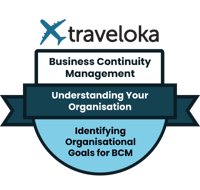

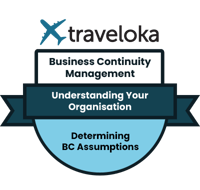
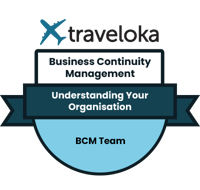

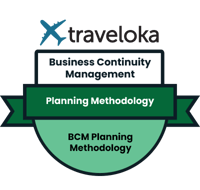
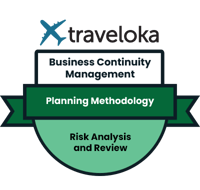
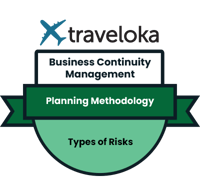








![Register [BL-B-3]*](https://no-cache.hubspot.com/cta/default/3893111/ac6cf073-4cdd-4541-91ed-889f731d5076.png)



![FAQ [BL-B-3]](https://no-cache.hubspot.com/cta/default/3893111/b3824ba1-7aa1-4eb6-bef8-94f57121c5ae.png)
![Email to Sales Team [BCM Institute]](https://no-cache.hubspot.com/cta/default/3893111/3c53daeb-2836-4843-b0e0-645baee2ab9e.png)





